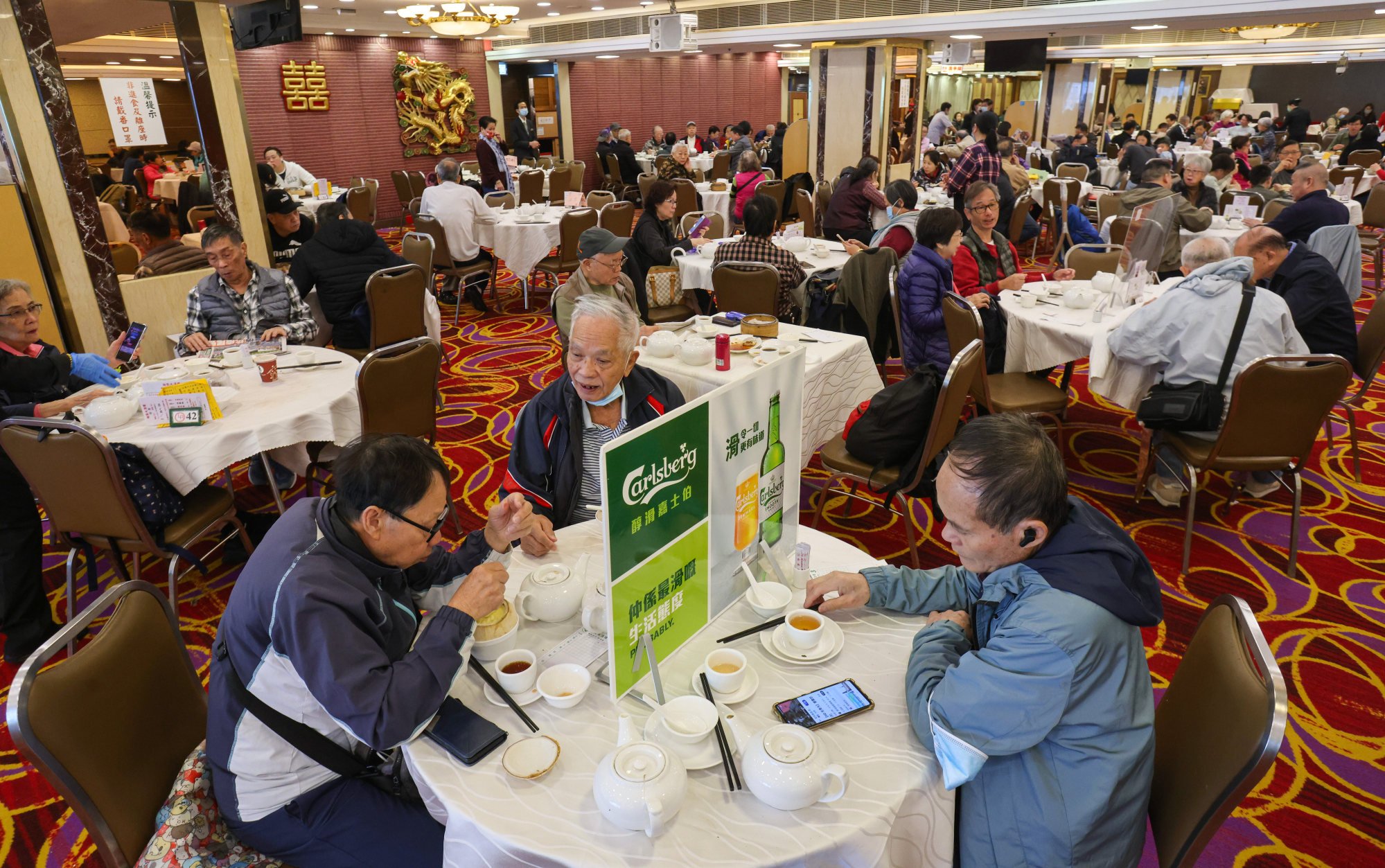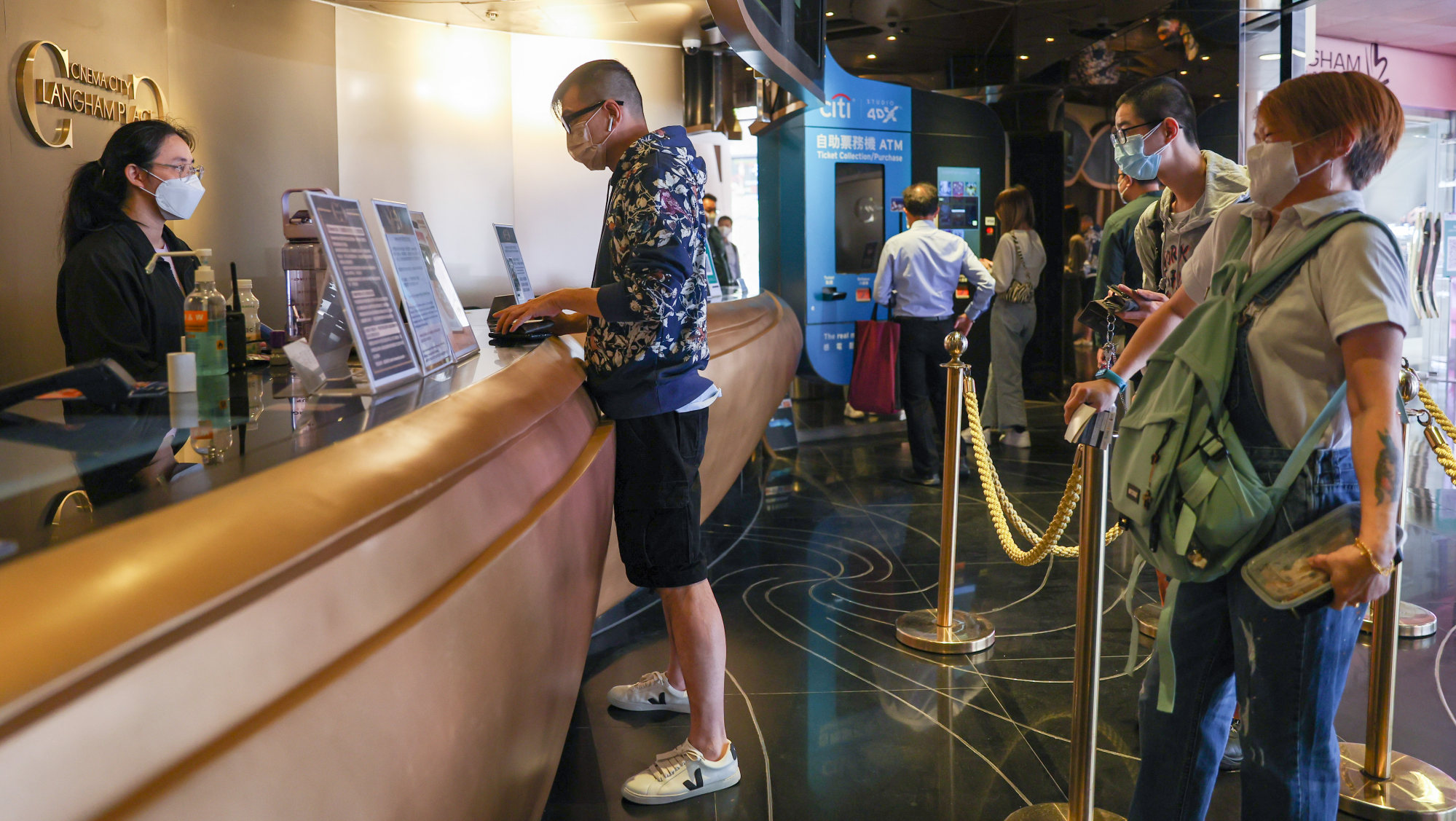
Coronavirus: many Hong Kong restaurants, cinemas, karaoke lounges say they will not reject infected customers, but others pledge to be more cautious
- Some restaurants have said they will reject positive cases, while others reveal they will allow infected diners on their premises
- Five cinemas the Post called said infected people would be allowed entry, while one advised those who tested positive to stay home
Many of Hong Kong’s catering and entertainment venues have said they will adopt a business-as-usual approach when dealing with customers infected with Covid-19, but some have vowed to be more cautious and advise positive cases to stay home.
The mixed reactions came to light after the government scrapped mandatory isolation for Covid-19 patients last Monday, ending restrictions on their movements citywide.
A Post check found that some restaurants had followed the authorities’ latest guidelines for people who test positive, under which they are advised to avoid having meals with others at the same table and stay away from crowds or large gatherings.

Those who showed symptoms are urged to stay home, while asymptomatic cases are allowed to go out, including returning to work.
A member of staff at Man Wah, a Michelin-starred restaurant at the Mandarin Oriental hotel, said if customers admitted they had tested positive, they would advise them not to enter the premises until they returned a negative result.
At another fine dining restaurant, Lai Ching Heen in Tsim Sha Tsui, a staff member said they would reject known positive cases from entering, adding that a policy of taking the temperature of visitors and asking them to maintain a social distance of 1.5 metres would be upheld.
Ray Chui Man-wai, president of the Institute of Dining Art, who also chairs Kam Kee Catering Group, said while customers with Covid-19 rarely disclosed their infection, his staff would advise positive cases to get takeaway instead.
“Of course we, the catering industry, will serve anyone,” he said. “If [infected customers] are determined about dining in, we may arrange a corner with less people for them.”
Some small local restaurants said they would serve infected diners if they did not know about their Covid-19 status.
“Usually the guests won’t say if they are positive or negative so we just don’t know,” said Bo Hui, the owner of Luen Wah Cafe in Sai Wan. “If a guest appears to be very sick, I will just ask them to sit in the corner.”
Hong Kong bosses welcome axing of Covid isolation, want action to revive tourism
A staff member at local restaurant chain Tsui Yuen in Sai Ying Pun said she would allow infected visitors to dine in, tell them to wear a mask as soon as they finished eating and ask them not to approach other customers.
Representatives of other premises such as bars, cinemas, karaoke parlours and gyms also said it depended on the customer’s decision and their health conditions.
Ben Leung Lap-yan, the charter president of the Licensed Bar and Club Association of Hong Kong, said he believed customers would rarely reveal their infection status and they would not be required to show negative test results.
“After experiencing pandemic restrictions for almost three years, our industry will not create obstacles that will affect businesses, especially since the city has relaxed requirements for infected individuals,” he said. “If someone tells us about their infection, we will advise them to avoid gatherings.”
He added that if patrons showed symptoms while at the bars, staff would ask them to wear a mask or invite them to sit in a less crowded area.
Hong Kong Motion Picture Industry Association chairman Crucindo Hung Cho-sing said cinemas would not ask for negative test results as restrictions for infected individuals had been lifted, adding that there was no reason to reject customers.

Posing as an infected customer, a Post reporter called six cinemas operated by four different circuits, and five karaoke lounges run by two separate companies. Five of the cinemas said infected people would be allowed entry, while one advised those who tested positive to stay home.
Three karaoke lounges said infected patrons could enter their venues, but they should wear masks at all times except when eating or drinking. One said customers could make the choice themselves based on their symptoms, while another revealed that it preferred if those who were infected would not visit.
Wong Wing-sum, executive director of the Physical Fitness Association of Hong Kong, China, said most gyms also would not require a negative test result but trainers would recommend infected members to get some rest for the sake of their health.
A look at Hong Kong’s Covid-19 restrictions and their long-term effects
He said many of their clients who are health-conscious would usually alert trainers or gyms about their infection to prevent the transmission of the virus among members.
“As doing exercise may exhaust the body … we recommend that people avoid high intensity exercise when they are sick,” he said.
Two separate gyms also said that they recommended infected members not to visit and expiration dates of memberships or courses could be extended if they provided medical proof.
The Equal Opportunities Commission earlier said refusing to serve infected customers without a reasonable explanation might constitute discrimination.
The commission’s chief, Ricky Chu Man-kin, said staff should deal with infected people the same as they treated patients with other infectious diseases before the pandemic.


